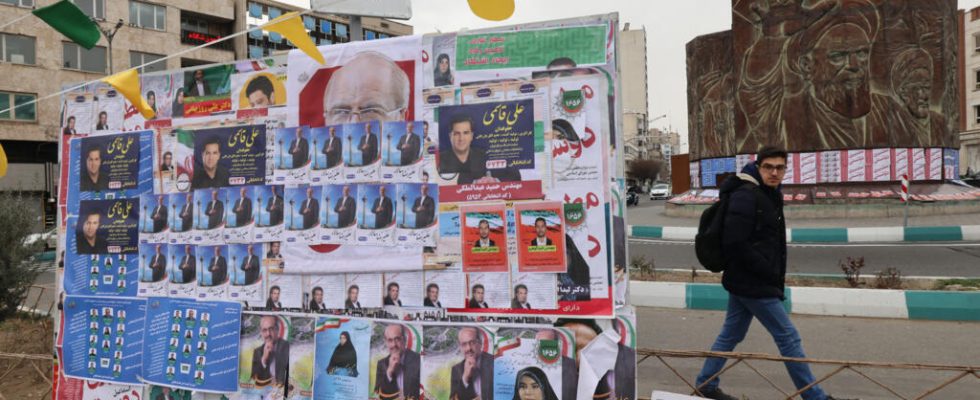Two years after the historic “Woman, Life, Freedom” movement, Iran is organizing legislative elections on Friday March 1 to renew the Assembly of Experts, responsible for electing the next supreme leader. Elections where the democratic space is reduced, with the majority of candidates critical of power disqualified. Is this authoritarianism a demonstration of the authorities’ continued total control over the country, or rather an admission of weakness of a power that is struggling to legitimize itself?
5 mins
Three years ago, Ebrahim Raïssi was elected president of the Islamic Republic of Iran. Despite the critical voices which already denounced the lack of real competition, the former head of the Iranian judicial system embodied for his electorate the hope of a righteous and just man, who would put an end to the endemic corruption of the Iranian system, partly responsible of the country’s serious economic crisis.
One year later, the young Mahsa Amini was arrested by security forces in Tehran for “ incorrect wearing of the veil “. Taken directly from the police station to the hospital, her death was officially announced three days later by the authorities, the spark that launched the “Woman, Life, Liberty” movement. After months of bloody repression and a continuing civil resistance movement, Iranians are invited to vote to elect their representatives to Parliament as well as the major experts responsible for choosing the next supreme leader, the one who will replace Ali Khamenei, today aged 84.
“ The break is complete between ordinary people and the power in place », notes Chirinne Ardakani. The lawyer is a member of the “Iran Justice” collective which attempts to collect evidence of the abuses of the Iranian regime. “ After the violent suppression of the 2022 protests, the Iranian people have deployed other strategies to avoid direct confrontationshe explains. Women refuse to re-veil themselves in public spaces despite patrols by the moral police. Workers mobilized massively on strike and during demonstrations, against a backdrop of social demands, in the context of a continuing economic crisis. »
Last sign of this rupture: the broad call to boycott the electionsnotably from the cells of political prisoners, headed by the Nobel Peace Prize winner Narges Mohammadi, for whom Chirinne Ardakani is the lawyer.
Read alsoLegislative elections in Iran: “One in three Iranians lives below the poverty line”
Reform candidates within conservative lists
These elections are therefore taking place with few unknowns, since the disqualification of numerous candidates reduces them to a competition between conservatives and ultra-conservatives, with a participation rate announced below 30%. Despite everything, Thierry Coville, researcher at the Institute of International and Strategic Relations, draws attention to certain lists – certainly conservative – but still critical of the power in place. “ There are debates within the Iranian political system with people who point out that in the Islamic Republic of Iran, there is still the word “republic”. They ask the question: “Can we continue like this with this divide within the population?” », Indicates the researcher.
The major reforming figures having been sidelined, certain reforming candidates have also chosen to join these lists, rather than giving up hope of reforming the system from within the system. “ Is there the possibility within of having some sort of opposition? “, asks Thierry Coville “ For example, there is Ali Motahari in Tehran who is considered centrist. This is perhaps one of the issues of these elections “, says Thierry Coville.
“ The regime does not really feel threatened in the short term »
Another issue remains that of participation, a test of legitimacy for the Islamic Republic, after the most serious political crisis in its history caused by the “Woman, Life, Liberty” movement. The figures of power therefore called for votes to strengthen the unity of the country, on the national and international stages. “ But in reality, the regime does not really feel threatened in the short term », Estimates Thierry Coville.
On the international scene, he was able to assert himself again by presenting himself as the master of order and chaos in the region, via his links with Hamas in Gaza, Hezbollah in Syria, Iraq and Lebanon and with the Houthis in Yemen . After openly supporting the “Woman, Life, Liberty” movement, Western governments have “ puts realpolitik logic first when dealing with the Iraniansregrets Chirinne Adrakani. There was a conscious arbitration that was made, delivering the message: “We hear the Iranian people’s aspiration for democracy, public freedoms and equality between women and men, but we can do nothing for them, because the balance of power today is on the side of political power Iranian”. »
Chirinne Ardakani therefore sadly shares the same observation as Thierry Coville. “ Today, fear is still on the side of those who risk imminent arrest, are in danger of death. I think we should not underestimate the sophistication of the totalitarian regime of the Islamic Republic of Iran. But the resistance movement of civil society is long-term, and that is what will make the difference. At some point, the question of the succession of the supreme leader will arise, and this is perhaps where a new window of opportunity will open. », she judges.
Indeed, Ali Khamenei is 84 years old and reportedly suffering from cancer. This Friday, March 1, the major experts responsible for choosing a successor will be elected, with once again hand-picked candidates. But this lockdown by the authorities may not be enough to avoid the crisis, because no successor guarantor of unity is clearly needed today.
Read alsoLaunch of the legislative campaign in Iran: “Everything is locked”
